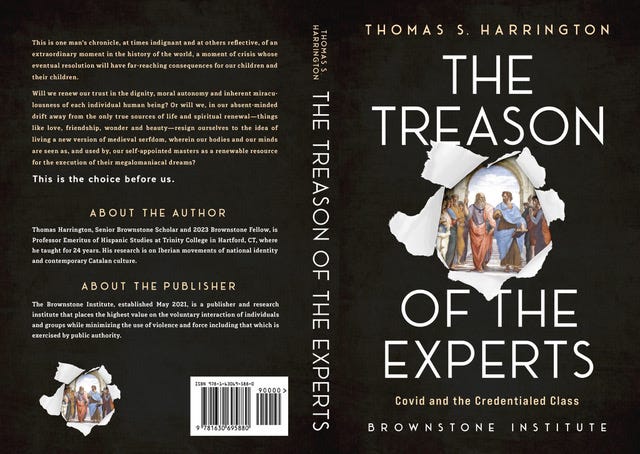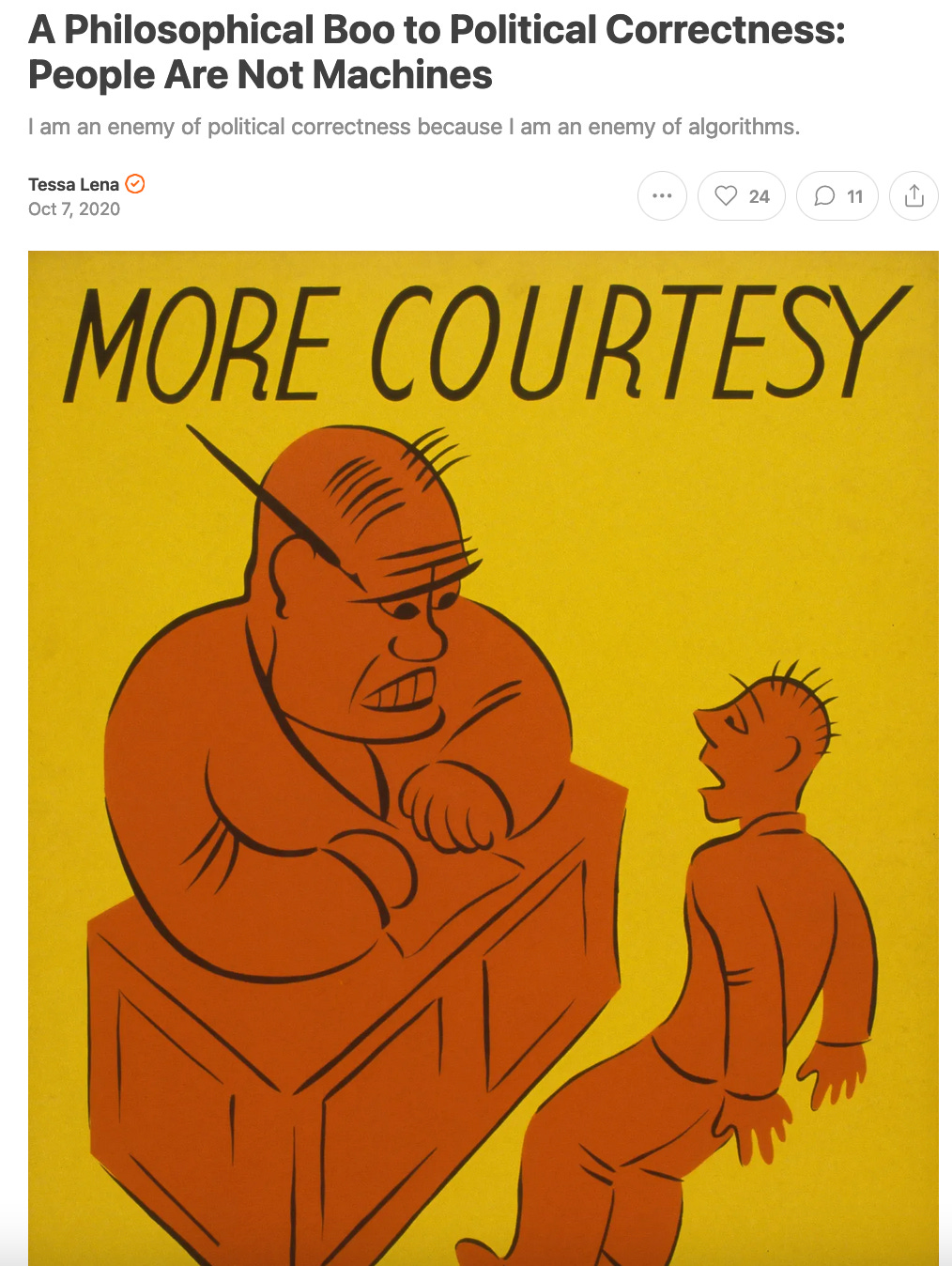First, a PSA: I will soon be sending two tremendously interesting interviews, one with Igor Chudov, and another one is with Steven Newcomb. I am extremely excited about both!
Now to the story.
This story is about my conversation with a human being whose work, when I first encountered it a few months ago, struck me as unbelievably and ridiculously resonant to my own—which, if we are honest with ourselves, is the most joyous compliment one can give. Which is to say, this conversation is with my brother from another mother, Thomas Harrington.
Here is Thomas’ official bio from his author’s page on the Brownstone Institute website:
Thomas Harrington, Senior Brownstone Scholar and 2023 Brownstone Fellow, is Professor Emeritus of Hispanic Studies at Trinity College in Hartford, CT, where he taught for 24 years. His research is on Iberian movements of national identity and contemporary Catalan culture. His essays are published at Words in The Pursuit of Light.
During the interview, we explored our common areas and differences and discussed many interesting things: the power of language, COVID narratives and abuses, spiritual robbery as a signature of our civilization and sensory deprivation of modern life, the tragedy of reducing life to a series of transactional relationships, and, unexpectedly, the original sin. We also went down the rabbit hole a little bit, you’ll see.
I don’t want to spoil the flow by singling out talking points. It really came out very interesting and exciting, and I hope you enjoy it as much as I did.
Importantly, Thomas has a book coming out soon, “The Treason of the Experts.”
After we did the interview, I found Thomas’ article “The Full Secularization of the Doctrine of Original Sin,” complementary to what we discussed. The quote only gives a partial idea of what Thomas is saying, so please read the entire thing!
To be born “fallen,” as the saying goes, is to be marked by an irremediable fragility which, in turn, impels one inexorably toward the arms of others in search of the succor we both need and want. It may even impel us, in time, to create fairly complex organizations devoted to safeguarding the common good of those who voluntarily subscribe to them.
So far, so good.
What history shows us is not so good, however, is when a group of elites establishes itself the prime if not sole arbiter of the processes in which the individual must participate if he or she is to have any hope of transcending their allegedly fallen state. In this context, original sin, which is to say the belief in the core insufficiency of the individual before god and others, becomes little more than an open justification for a never-ending series of rituals designed to reinforce the supplicatory posture of the many before power and prerogatives of those few making and reinforcing the rules.
This, in grossly simplified terms, is what the Church of the Rome did, or at least sought to do, for roughly 1500 years, before secular modernity, building upon the incremental critiques of Church-managed schemes of redemption implicit in the Renaissance, and the Reformation, convinced many, if not most of their inherent worthiness and resilience before the world.
It is, I think, never a waste of time to try and put ourselves in the place of others and to imagine how they see the world. If for example, I were part of a small group of people made fabulously wealthy and powerful by the existing social order, and I saw clear signs of that order’s demise on the horizon—a demise seemingly caused by a rapidly growing skepticism in many quarters regarding the guiding mythologies of its operations—how might I respond?
It is nice to think that I would look inward and ask myself what I and my fellow oligarchs had done to lose the trust of the people, to make them so increasingly boisterous and irreverent in the face of what were once our largely unquestioned mandates on their behavior? History, however, shows us the powerful seldom react in this manner.
Since Thomas, very appropriately in my opinion, highlights the notion of fragility and explores the ways in which this notion is being used—again and again—to dominate, here is my take proposing a similar idea, although in this particular article, I don’t mention the parallel to the original sin.
Different aspects of today’s bizarre reality are connected like pieces of a puzzle. The trendy political correctness, for example, draws from the same logical root as vaccinating people with natural immunity. How so? Well, political correctness exists to ensure that conversational spaces are safe spaces—and the need to make them safe is based on the premise that human beings are not capable of navigating unregulated conversational spaces without being harmed. Those who are capable of doing so should act as if they are not. The assumption here is that the natural ability to deal with unregulated conversations does not exist, is not necessary to develop, and mentioning the need for it is cruel.
Similarly, forcing the famous medical product on those with natural immunity is based on the premise that artificial immunity is superior to natural immunity. Furthermore, the strong push for the product, combined with an attack on anyone who even squeaks about comparable benefits of anything natural—be it a healthy life style or actual natural immunity—presumes that artificial tools and mechanisms should be used to replace the natural ability of the body to stand up to pathogens. And similarly, both an expectation of natural immunity in anyone and a refusal to supersede or replace one’s natural immunity with an artificial one are framed as cruel.
I posit that in logical and commercial terms, this war on the natural world, natural immunity—and natural ability at large—can be explained with clarity in terms of what is known as the “blue ocean strategy,” with an infusion of transhumanist ideology of human body as a [product] platform.
The blue ocean strategy is a business strategy that proposes creating a brand new market out of thin air and dominating it (a blue ocean)—as opposed to trying to compete in an existing market (an ocean red with blood).
Here’s how it applies to natural immunity. A healthy person with a natural immunity might be a happy person—but to a 2021 biotech entrepreneur, who views the human body as a market to dominate, he is a sheer insult. From the standpoint of that entrepreneur, replacing the default natural immunity of the past millions years with a fully artificial tool that requires a “subscription” throughout one’s entire lifetime (see “variants” and “boosters”) is desirable. Replacing the default natural immunity with an artificial tool is a very successful case of creating a brand new market (“artificial immunity market”) out of air. A life-long subscription to artificial immunity, with an ever-expanding range of necessary “upgrades,” is a lot more profitable than some rookie traditional shop selling vitamins. Even better, if artificial immunity destroys the natural immunity, customer loyalty is guaranteed. See how elegant?
And, on the topic of political correctness (I just really like the poster, it’s pretty accurate, I think):
Also this: Grow Some Balls: A Sour Letter to Establishment Intellectuals (July 2020)
If for any reason you are having issues with the Substack video, here it is on Rumble:
Note to readers: If you are in the position to do so, I encourage you to become a paid subscriber or donate. I love you in any case, but it helps A LOT. Thank you from my heart for your support!








Share this post